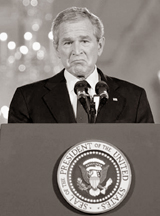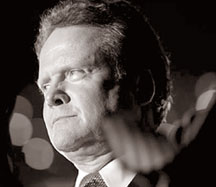|
observer |
|
|
|
|
|
OTHER LINKS |

|

|

|
Democrats gain:Rejection of Bush
Democratic gains in Tuesday's midterm elections serve as proof that the U.S.'s war in Iraq has been soundly rejected and it's time to rethink the campaign, according to some observers. Democrats secured a majority in the House of Representatives, and had elected 48 senators as well as two Democratic-voting independents by Wednesday afternoon. The battle for outright senate control came down to Virginia, where the Democratic challenger held a thin lead over Republican incumbent George Allen. Continued bloodshed in Iraq - with mounting casualties on both the American and Iraqi sides - is seen by many as the key detractor from Republican popularity. "Voters have punished the Republicans," Chandra Muzaffar, president of the Malaysia-based think-tank International Movement for a Just World told The Associated Press. "They are not happy with the way the leadership has handled the Iraq war." But according to reports, many Iraqis expected the results to have little effect on their daily lives."Iraq is long ruined and American policy is fixed, whichever party takes control of Congress. If the Democrats can finally bring us some security they are welcome, but I believe no one can succeed," Abdullah, a 28-year-old computing student, told Reuters news service. Mohamed Husni, a 24-year-old Iraqi taxi driver, said he hoped the shift in Congress would bring an immediate withdrawal, but doubted that it would happen. "The Democrats have been saying they will withdraw but I'm sure they will disappoint us. The Americans have ruined everything and the only solution is to let Iraqis deal with this mess," he told Reuters.
Some analysts agreed, a major shift in Iraq is unlikely. "There would have been some concern in policy making circles here if the Democrats had said: 'We are definitely going to withdraw by Christmas,' but they're not able to say that," Michael McKinley, a political science professor at the Australian National University told AP. "They will have concluded that it is unlikely to have radical significance in the area of U.S. foreign and strategic policy." Bush's critics in many Muslim countries around the world welcomed the election results, however. Vitaya Wisetrat, a prominent, anti-American Muslim cleric in Thailand said support for the war is no longer guaranteed as it was immediately following the 9/11 terrorist bombings. "The Republicans lost in the election because the American voters are now fed up and bored with the war. The American people now realize that Bush is the big liar." Others around the world hoped that the election results would mark a shift in priorities for the U.S., with a transition to a greater focus on trade policies and human rights. Abdul Hamid Mubarez, an Afghan analyst and former deputy Afghan information and culture minister, told AP he hoped the Democratic victories would lead to more reconstruction money for his country. Ahmad Sumargono, an Indonesian lawmaker, said he hoped the U.S. would now rethink its foreign policy. "I am optimistic that American people have now realized the mistakes made by Bush in foreign policy. We hope this leads to significant changes, especially toward the Middle East," Sumargono said. The U.S. relationship with North Korea will also come under the microscope as the Democrats transition to a position of greater power. Some have suggested a Democratic win would spur a softening of U.S. policy towards Pyongyang, but others feel that is unlikely to happen in Bush's final two years in office. "Why should he change his policy line?" asked Kim Tae-Woo. "The Bush administration will feel no need for changes in the six-party talks." In China, some worried the Democratic Party's focus on protecting small American business interests, and concern over human rights and trade and labour issues could pose a challenge to China's massive trade relationship with the U.S. "The Democratic Party will protect the interests of small and medium American enterprises and labor and that could produce an impact on China-U.S. trade relations," said Zhang Guoqing of the state-run Chinese Academy of Social Sciences. The comments were included in a report on Sina.com. The election results will mark a major loss of power for President George Bush, and many predict the results will hurt his presidency and his legacy. "Although his term will not end within the next year, I think Bush is already turning into a lame duck," said Yuzo Yamamoto, 60, the manager of a Tokyo business consulting firm. The Associated Press |












